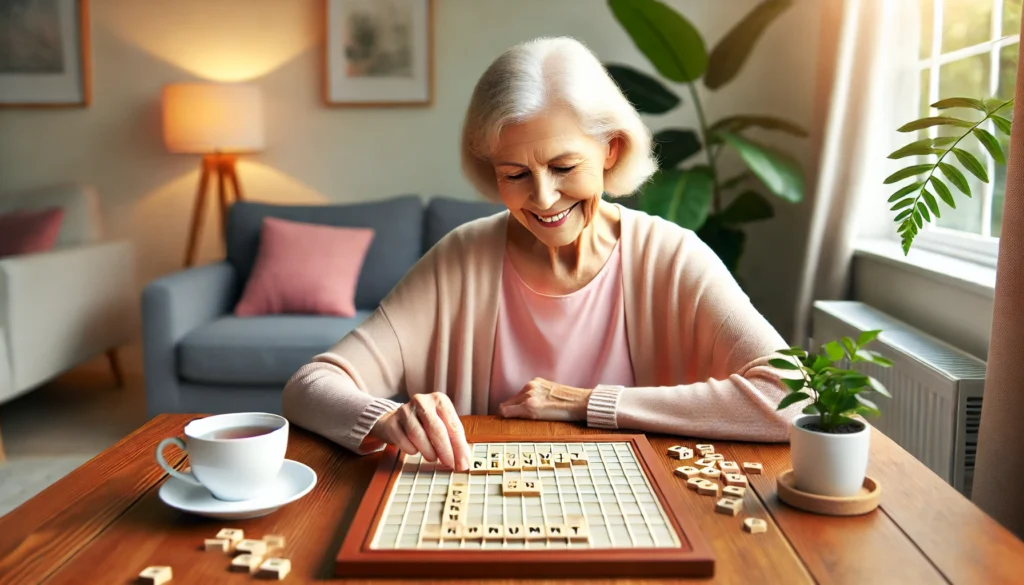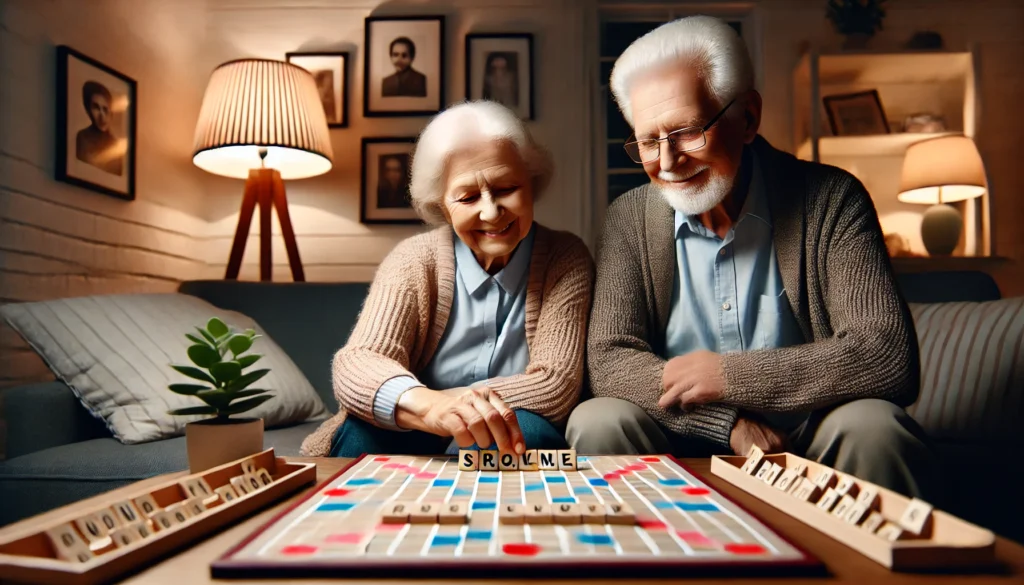Cognitive stimulation is recognized as a cornerstone of dementia care. Engaging in activities that challenge the brain can slow the progression of cognitive decline, improve mood, and enhance social interactions. Word games, in particular, provide a fun and accessible way to offer this stimulation.
You may also like: Boost Your Mind: Top Brain Games
Historical Context and Development
The use of games and puzzles in dementia care has deep roots in the philosophy of therapeutic recreation. This approach emphasizes the role of leisure activities in enhancing physical, cognitive, and emotional well-being. Over time, the therapeutic value of word games specifically has gained traction, with evidence showing their effectiveness in improving cognitive functions in seniors.
The Origin of Therapeutic Recreation
Therapeutic recreation began as an innovative approach to health, focusing on the holistic well-being of individuals through leisure activities. Early practitioners observed that structured play and games could significantly impact mental health and cognitive abilities, laying the groundwork for their use in dementia care.
Evolution of Word Games as Therapy
As understanding of cognitive health evolved, word games emerged as a powerful tool in therapeutic settings. Initially, simple word puzzles were used to engage patients, but over time, more complex and varied games were developed to cater to different cognitive levels and interests.
Modern Adoption and Validation
In recent years, word games have gained formal recognition in therapeutic contexts, supported by scientific research. Studies have demonstrated their ability to enhance memory and cognitive function, leading to widespread adoption in care facilities worldwide.
Current Trends and Innovations
In today’s rapidly advancing technological landscape, word games are continually evolving. Innovations in digital platforms are making these games more accessible and engaging for dementia patients.
The Rise of Digital Word Games
Digital platforms offer a new dimension to word games, providing interactive and customizable experiences. These platforms can adapt to the user’s cognitive level, offering appropriate challenges and tracking progress over time, which is invaluable in a therapeutic context.
Virtual Reality and Interactive Technologies
Virtual reality (VR) and augmented reality (AR) technologies are being explored for their potential to immerse dementia patients in engaging environments. These technologies can simulate real-life scenarios where word games are integrated, offering a novel way to stimulate cognitive functions.
Personalized Game Design
With advancements in AI and machine learning, word games can now be tailored to individual preferences and cognitive abilities, offering a more personalized and effective therapeutic experience.
Future Implications and Opportunities
As our understanding of dementia and cognitive health continues to evolve, word games’ potential applications in therapeutic contexts are likely to expand significantly.
Expanding Research and Insights
Ongoing research is crucial for uncovering new benefits and applications of word games. Future studies may reveal additional cognitive and emotional benefits, further solidifying their role in dementia care.
Integration with Comprehensive Care Plans
Word games are increasingly seen as a complementary component of comprehensive dementia care plans. They can be integrated with other therapeutic activities to provide a holistic approach to cognitive health.

Opportunities for Innovation
The future holds exciting possibilities for innovation in word games, including more advanced digital platforms and interactive experiences. These innovations promise to enhance engagement and effectiveness in dementia care.
Types of Word Games for Dementia Patients
A wide variety of word games can be adapted to suit the needs and abilities of dementia patients. Here are some popular options that provide cognitive stimulation and enjoyment.
Crossword Puzzles
Crossword puzzles are a classic choice for cognitive stimulation, encouraging problem-solving, enhancing vocabulary, and improving memory recall.
Simplified Crosswords
For dementia patients, simplified crosswords with larger print and easier clues can be particularly beneficial. These adaptations ensure that the puzzles remain challenging yet accessible, promoting a sense of achievement upon completion.
Thematic Crosswords
Thematic crosswords, which focus on specific topics or interests, can further engage patients by connecting the puzzles to their personal experiences or hobbies, enhancing both enjoyment and cognitive stimulation.
Interactive Digital Crosswords
Digital crosswords offer an interactive experience, allowing patients to receive hints and feedback in real-time. This can make the game more engaging and provide immediate reinforcement, which is beneficial for learning and memory.
Word Search
Word search games are excellent for visual recognition and concentration, being straightforward to play and adaptable to different difficulty levels.
Customizable Word Searches
Customizing word search puzzles to include familiar names or topics can increase their relevance and interest for dementia patients, making the activity more engaging and enjoyable.
Large Print and Visual Aids
Using large print and visual aids in word searches can assist those with visual impairments, ensuring that the game remains accessible to all seniors, regardless of their physical limitations.
Group Word Search Activities
Word searches can be turned into group activities, promoting social interaction and teamwork. This can be particularly beneficial in care settings, where socialization is an essential aspect of therapy.
Anagrams and Scrabble
Anagrams and Scrabble are excellent for promoting mental agility and creativity, encouraging strategic thinking and social interaction.
Simplified Anagram Activities
Simplified anagram activities, where letters are rearranged to form familiar words, can be less daunting for dementia patients, providing a sense of accomplishment without overwhelming them.
Scrabble for All Abilities
Adapting Scrabble to suit different cognitive levels can make the game more inclusive. By adjusting the rules or providing assistance, caregivers can ensure that all participants can enjoy and benefit from the game.
Social Benefits of Group Play
Playing Scrabble in groups can enhance social interaction, fostering a sense of community and support among participants. This social element is crucial for emotional well-being and can lead to lasting friendships.
Storytelling and Fill-in-the-Blank Activities
These activities stimulate imagination, memory recall, and verbal communication, promoting creative expression and engagement.
Guided Storytelling Sessions
Guided storytelling sessions, where participants are prompted with specific words or themes, can encourage creativity and expression. These sessions can be both therapeutic and enjoyable, allowing patients to share their stories and experiences.
Personalized Fill-in-the-Blank Exercises
Personalizing fill-in-the-blank exercises with familiar contexts or names can enhance engagement, making the activity more meaningful and relatable for dementia patients.
Collaborative Story Creation
Collaborative story creation, where patients work together to build a narrative, can foster teamwork and social interaction, providing an enjoyable and supportive environment for cognitive stimulation.
Implementing Word Games in Daily Routines
Integrating word games into the daily routines of dementia patients requires careful consideration of their interests, abilities, and energy levels. Here are some practical tips for successful implementation.
Personalization and Adaptation
Choosing games that align with the individual’s preferences and cognitive capabilities is crucial for engagement and enjoyment.
Assessing Individual Interests
Understanding each patient’s interests and preferences is the first step in selecting appropriate games. This assessment can guide caregivers in choosing activities that are both enjoyable and stimulating.
Adapting Games to Cognitive Levels
Adapting games to match the patient’s cognitive level ensures that they remain challenging yet achievable. This balance is essential for maintaining motivation and preventing frustration.
Incorporating Familiar Elements
Incorporating familiar elements, such as names or themes from the patient’s life, can make games more relatable and engaging, enhancing both cognitive and emotional benefits.
Creating a Supportive Environment
A supportive environment is essential for concentration and relaxation, maximizing the benefits of word games.
Minimizing Distractions
Minimizing distractions in the environment, such as noise or clutter, can help patients focus on the game, improving both enjoyment and cognitive benefits.
Providing Comfortable Seating
Comfortable seating is important for ensuring that patients can engage in activities for extended periods without discomfort, promoting sustained concentration and enjoyment.
Encouraging Participation Without Pressure
Encouraging participation without pressure allows patients to engage at their own pace, reducing anxiety and enhancing the therapeutic benefits of the activity.

Involving Caregivers and Family Members
Involving caregivers and family members can enhance the social aspect of word games, strengthening bonds and creating shared experiences.
Facilitating Family Participation
Facilitating family participation in word games can strengthen relationships and provide emotional support, enhancing the overall therapeutic experience for dementia patients.
Training Caregivers in Game Facilitation
Training caregivers in game facilitation ensures that they can effectively support and engage patients, maximizing the cognitive and emotional benefits of the activities.
Creating Shared Experiences
Creating shared experiences through word games can foster a sense of community and belonging, providing emotional support and enhancing the quality of life for dementia patients.
Scientific Insights and Benefits
Research shows that engaging in word games can have several positive effects on the cognitive and emotional well-being of dementia patients.
Evidence-Based Approaches
Studies suggest that these activities can improve memory, attention, language skills, and even mood, offering a sense of achievement and empowerment.
Cognitive Benefits of Regular Participation
Regular participation in word games is associated with improved cognitive functions, including memory and attention, contributing to a slower rate of cognitive decline in dementia patients.
Emotional and Social Benefits
Word games also offer emotional and social benefits, promoting positive mood and enhancing social interactions. This holistic impact is crucial for improving the overall quality of life for dementia patients.
Longitudinal Research Findings
Longitudinal research findings continue to support the cognitive and emotional benefits of word games, providing a robust evidence base for their use in dementia care.
Practical Advice for Health and Wellness Coaches
For health and wellness coaches, incorporating word games into their clients’ care plans can be an effective strategy for promoting cognitive health.
Staying Informed on Research and Trends
Staying informed about the latest research and trends in cognitive health allows coaches to provide evidence-based recommendations that are both practical and impactful.
Tailoring Recommendations to Individual Needs
Tailoring recommendations to individual needs ensures that clients receive personalized and effective support, maximizing the cognitive and emotional benefits of word games.
Collaborating with Care Teams
Collaborating with care teams, including caregivers and family members, ensures a comprehensive approach to cognitive health, enhancing the overall effectiveness of care plans.

Conclusion
Word games offer a valuable tool for enhancing the lives of dementia patients by providing cognitive stimulation, promoting social interaction, and encouraging creative expression.
The Growing Role of Word Games in Dementia Care
As our understanding of dementia and cognitive health continues to grow, word games will undoubtedly play an increasingly important role in therapeutic and recreational settings.
Empowering Individuals and Caregivers
Understanding the benefits and applications of word games empowers individuals and caregivers to make informed decisions and provide valuable support to those in need.
Bridging the Gap Between Research and Practice
Bridging the gap between research and practice ensures that the latest insights and innovations in word games are effectively integrated into dementia care, enhancing the quality of life for patients.
A Promising Future for Cognitive Health
The future holds promise for cognitive health, with word games continuing to evolve as a key component of comprehensive dementia care strategies, offering hope and support to patients and their caregivers alike.
Further Reading:
The Connection Between Brain Games and Dementia Prevention
50 Fun Word Games for Older Adults
6 Fun Word Games for Aging Adults
Important Note: The information contained in this article is for general informational purposes only, and should not be construed as health or medical advice, nor is it intended to diagnose, prevent, treat, or cure any disease or health condition. Before embarking on any diet, fitness regimen, or program of nutritional supplementation, it is advisable to consult your healthcare professional in order to determine its safety and probable efficacy in terms of your individual state of health.
Regarding Nutritional Supplements Or Other Non-Prescription Health Products: If any nutritional supplements or other non-prescription health products are mentioned in the foregoing article, any claims or statements made about them have not been evaluated by the U.S. Food and Drug Administration, and such nutritional supplements or other health products are not intended to diagnose, treat, cure, or prevent any disease.


